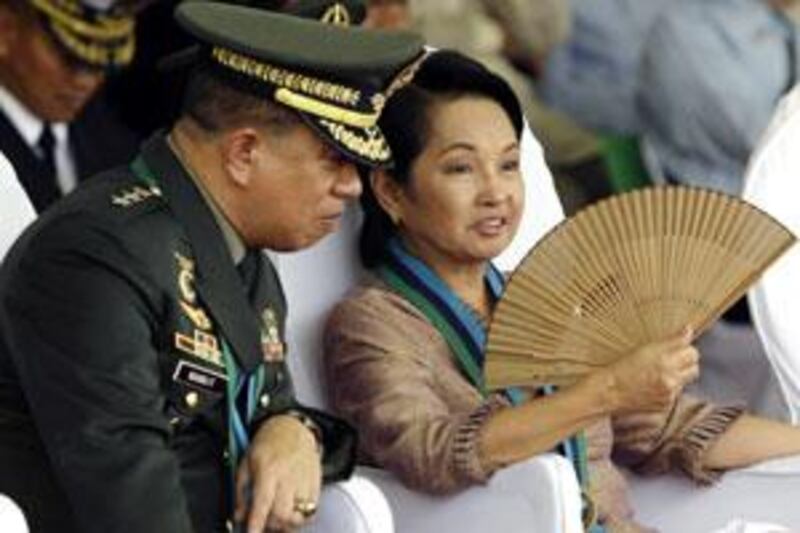Manila // With less than 60 days left before Filipinos go to the polls in the country's first fully automated elections, there are growing concerns over transparency and the risk that the system will break down leading to political instability.
The announcement on Wednesday that President Gloria Macapagal Arroyo can name the country's next chief justice has added to the growing uncertainty. Nine of the country's 15 Supreme Court justices voted in favour of allowing the outgoing president to nominate a replacement to the chief justice, Reynato Puno. The announcement follows the appointment last week of Lt Gen Delfin Bangit, a close ally of Mrs Arroyo and known locally as "the emperor", as chief of staff of the armed forces.
Senate president Juan Ponce Enrile has warned that if the elections fail and there is no elected president, vice president and congress by June 30 - the day when Mrs Arroyo's term ends - the military will be forced to step in and appoint a transitional administration. Mr Enrile is no amateur player when it comes to Philippine politics. As one of the former leader Ferdinand Marcos's trusted lieutenants he faked his own assassination to help usher in martial law on September 21, 1972. He later became a key player in the People Power movement, which eventually toppled Marcos in February 1986.
Renato Reyes, the secretary general of the left-wing group Bayan, said the appointment of Gen Bangit as chief of staff had created a "great deal of uncertainty". "The biggest question in his appointment is his perceived closeness to the president, which, in the event of a failure of elections, may be useful in keeping Mrs Arroyo in power indefinitely. He may be Arroyo's ace up her sleeve should there be a power vacuum," he said.
A number of analysts and observers have voiced similar concerns about the May 10 elections in which more than 50 million people will vote not only to elect a president but thousands of local officials as well. Mr Roland Avante, Sterling Bank Asia treasurer and former president of the Money Market Association of the Philippines, told a press briefing on March 10 that there was a "real risk" that the elections would fail.
"Political instability is the one thing that we don't need," he said, adding that uncertainty is the one thing that has kept foreign investors away from the Philippines. Global Source, a New York-based think tank, said in a March 6 research paper called The Next 100 Days that there was a genuine concern among many Filipinos that the elections would fail. "While the Commission on Elections [Comelec] has been steadfast in defending the new system and has continuously dispelled talks of possible election failure, many fear that lingering doubts about the integrity of the new system would expose electoral results to challenge from losing parties, a risk which multiplied several times over could potentially whittle down public confidence and lead to failure of elections," the paper said.
Many people have expressed misgivings about Comelec's ability to carry out a nationwide automated election considering the country is an archipelago comprising more than 7,000 islands, with some of the more remote areas deprived of basic telecommunication services. The Washington-based National Democratic Institute (NDI) told a press briefing on March 13 that Comelec needs to do more to ensure the machines used to count ballots and transmit results from more than 350,000 precincts around the country are fraud-proof and have adequate back-up.
"There is growing concern that the process has not been sufficiently open and inclusive. In numerous meetings, the delegation perceived a high degree of anxiety and lack of confidence in the [automated] election process to date," the NDI said in a statement. The NDI delegation ? headed by Thomas Barry, NDI deputy regional director for Asia; Sam Gejdenson, former member of the US Congress; Nora Owen, former justice minister of Ireland; Jamie Metzl executive vice president of the Asia Society; and Sue Wood, former president of the New Zealand National Party - spent a week in Manila talking to electoral officials and non-government organisations on preparations for the vote.
The NDI said it had found Comelec had not done enough to allay public fears about the possibility of a breakdown in the election process. "The perception, whether fair or not, is that the Comelec has not done so. When it concerns elections, perceptions can be as important as reality," the NDI said. This perception has "inhibited public confidence in the elections and generated anxiety about the automated election system," it added.
"We are not underestimating the enormous challenge that's facing the Comelec in organising the Philippines' first fully automated elections. The Comelec itself admitted that it has fallen behind in its preparation," Mr Metzl said. Comelec had yet to reveal to candidates and voters what backup plan they had, in the event of a breakdown of the automated system. The National Movement for Free Elections (Namfrel), which has monitored every election in the Philippines since 1984, has withdrawn its application for accreditation with the Comelec.
Namfrel's application was rejected last month but the citizen's watchdog lodged an appeal with Comelec to reconsider its decision. "It's obvious the Comelec is not interested in Namfrel's assistance," Jose Cuisia, chairman of Namfrel, told a news conference last Friday. "There is a growing feeling of mistrust among the public which has fuelled a great deal of speculation that the elections will fail, seriously derailing the development of a mature democracy for the Philippines," he said.
@Email:foreign.desk@thenational.ae





